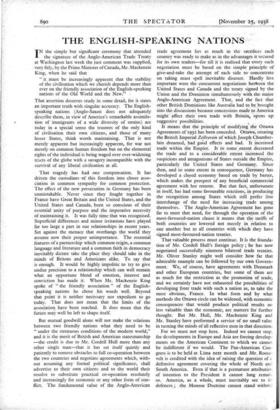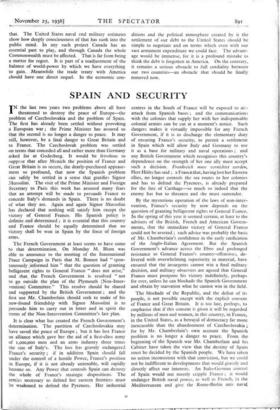THE ENGLISH-SPEAKING NATIONS .
IN the simple but significant ceremony that attended
the signature of the Anglo-American Trade Treaty at Washington last week the just comment was supplied, very fitly, by the Prime Minister of Canada, Mr. Mackenzie King, when he said that " it .must be increasingly apparent that the stability of the civilisation which we cherish depends more than ever on the friendly association of the English-speaking nations of the Old World and. the New?'
That assertion deserves study in some detail, for it states an important truth with singular accuracy. The English- speaking nations (Anglo-Saxon does not adequately describe them, in .view of America's remarkable assimila- tion of immigrants of a wide diversity of strains) are today in a special sense the trustees of the only. kind of civilisation their own citizens, and those of many lesser States, think worth maintaining. That is not merely apparent but increasingly apparent, for war not merely on common human freedom but on the elemental rights of the individual is being waged over ever-widening tracts of the globe with a savagery incompatible with the survival of any liberal civilisation at all.
-. That tragedy has had one compensation. It has driven the custodians of this freedom into closer asso- ciation in common sympathy for common protection. The effect of the new persecution in Germany has been unmistakable. Never since they fought together in France have Great Britain and the United States, and the United States and Canada, been so conscious of their essential unity of purpose and the imperative necessity of maintaining it. It was fully time that was recognised. Superficial differences and minor irritations have played far too large a part in our relationships in recent years. Set against the menace that overhangs the world they assume now their proper unimportance. The essential features of a partnership which common origin, a common language and literature and a common faith in democracy inevitably dictate take the place they should take in the minds of Britons and Americans alike. To say that is enough. It would be highly impolitic to try to give undue precision to a relationship which can well remain what an opportune blend of emotion, interest and conviction has made it. When Mr. Mackenzie King spoke of " the friendly association " of the English- speaking nations he chose his words well. Beyond that point it is neither- necessary nor expedient to go today. That does not mean that the limits of the association., have been reached. It does mean that the future may well be left to shape itself.
But mutual goodwill alone will not make the relations between two friendly nations what they need to be " under the strenuous conditions of the modern world," and it is the merit of British and American statesmanship —the credit is due to Mr. Cordell Hull more than any other single man—that it has set itself quietly and patiently to remove obstacles to full co-operation between the two countries and negotiate agreements which, with- out assuming any formal political significance, shall advertise to their own citizens and to the world their resolve to substitute practical co-operation resolutely and increasingly for economic or any other form of con- flict. The fundamental value of the Anglo-American trade agreement lies as much in the satrifices each country was ready to make as in the advantages it secured
for its own tradert—for till it is realised that 'every such negotiation must be based on' the simple principle- of give-and-take the attempt of each side to concentrate on• taking must spell inevitable disaster: Hardly less important were the. concurrent negotiations between the United States and Canada and the treaty signed by the Union and the Dominion simultaneously with the major Anglo-American Agreement. That, and the fact that other British Dominions like Australia had to he, brought into the disCiissionS because concessions made to America might' affect their own trade with Britain ofpens up suggestive' possibilities.
It means that the principle of modifying the Ottawa Agreements of 1932 has been conceded. Otta*a, Creating the British Inaperial Zollverein of Which JOseph Chamber- lain dreamed, had ,goOd effects and bad. 'It increased trade within the Empire. It to some .extent decreased the trade and to a considerable extent increased the suspicions and antagonisms of States outside the. Empire, particularly the United States and dermany. Since then, and to some extent in consequence, Germany has developed a closed economy based on trade by, barter, which makes the prospect of any beneficial commercial agreement with her remote. But that fact, unfortunate iri itself, has had some favourable reactions, in producing the recognition among States which still prefer free interchange of the need for increasing trade among themselves. The Anglo4merican Agreentent has gone far to meet that need, for through the operation of the most-favoured-nation clause it means that the tariffs of both countries are lowered not merely in . relation to one another but to all countries with which' they have signed most-favoured-nation treaties.
That valuable process must continue. It is the founda- tion of Mr. Cordell Hull's foreign policy ; -he has now negotiated successfully nineteen bilateral trade treaties. Mr. Oliver Stanley might well cOnsidet &AO far that admirable example can be followed by our own Govern- ment. We, of course, have agreements with Denmark and other European countries, but some Of' them are as much for the restriction as the promotion of trade, and we certainly have not exhausted the possibilities of developing freer trade with such a nation aS, to take the most obvious; France. In what form and by what methods the Ottawa circle can be widened, with economic consequences_ that would produce political 'results no less valuable than the economic, are matters for further thought But Mr. Hull; Mr. MackenZie. King and Mr. Stanley have performed a service of no small value in turning the minds of all reflective men in that direction. . For we must not stop here. Indeed we cannot stop. for developments in Europe and Asia are forcing develop- ments on- the American Continent to. .which we cannoi be indifferent if we would. The Pan-American Con- gress is to be held at • Lima next month and-Mr. Roose- velt is credited with the idea of raising the question of defensive agreement covering the whole of North ant South America. Even if that is a premature attributioi of intention to the President it cannot long remain so. - America, as a whole, must inevitably see to it defences ; the Monroe'Doctrine- cannot stand- without-. that. The United States naval and military estimates show how deeply consciousness of that has sunk into the public mind. In any such project Canada has an essential part to play, and through Canada the whole Commonwealth must be affected. That is far from being a matter for regret. It is part of a readjustment of the .balance of world-power by which we have everything to gain. - Meanwhile the trade treaty with America should have one direct sequel, In the economic con- ditions and the political atmosphere created by it the settlement of our debt to the United States should be simple to negotiate and on terms which even with our vast armament expenditure we could face. The advant- age would be immense, for it is a profound mistake to think the debt is forgotten in America. On the contrary, it remains a serious obstacle to full cordiality between our two countries—an obstacle that should be finally removed now.















































 Previous page
Previous page